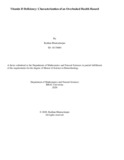| dc.contributor.advisor | Siddiqee, Mahbubul Hasan | |
| dc.contributor.author | Bhattacharjee, Badhan | |
| dc.date.accessioned | 2021-10-11T08:37:43Z | |
| dc.date.available | 2021-10-11T08:37:43Z | |
| dc.date.copyright | 2020 | |
| dc.date.issued | 2020 | |
| dc.identifier.other | ID 18176001 | |
| dc.identifier.uri | http://hdl.handle.net/10361/15214 | |
| dc.description | This thesis report is submitted in partial fulfillment of the requirement for the degree of Master of Science in Biotechnology, 2020. | en_US |
| dc.description | Catalogued from PDF version of thesis. | |
| dc.description | Includes bibliographical references (pages 88-117). | |
| dc.description.abstract | Vitamin D or sunshine vitamin is a hormone precursor, soluble in fat and plays an important role in our body by participating in several endocrine autocrine and paracrine activities. Since it has many pleiotropic health effects in our body, deficiency of this vitamin can create a negative impact on our health. Though worldwide 1 billion people were affected with vitamin D deficiency but it was quite surprising that many countries of the world, especially in South Asia, did not recognize this issue as a serious public health problem. My study results point out two important things; firstly, from systematic review results it was clear that vitamin D deficiency is highly prevalent in South Asian countries and more than 6 out of 10 South Asian individuals in respect to all age groups were affected with vitamin D deficiency. To overcome this scenario, all South Asian governments should revise their health policy and address vitamin D as an important factor to improve mass communication health status. Secondly, KAP study results showed that in Bangladesh, educated teenagers, young adults and doctors who were either studying or working in different institutions, had a lack of knowledge about vitamin D and its impact on our health. They also carried a negative attitude towards sunlight. Because of this negative notion and lack of knowledge, many of our study participants were not concerned about their vitamin D status. Our study points out that this large group of educated individuals never checked their own vitamin D level (85% from general group (College and University students) and 80% from medical group (medical students and doctors)). So it is necessary to create awareness both in medical and general students about the importance of vitamin D, how we can improve our vitamin D status easily with free of cost by sunlight exposure, and why vitamin D is essential to fight against several chronic diseases. In a society, it will be easy to improve all over mass communication health status if educated individuals of that society showed concern about certain serious health issues like vitamin D deficiency. Government and other stakeholders of Bangladesh related to public health need to come forward to address this issue. | en_US |
| dc.description.statementofresponsibility | Badhan Bhattacharjee | |
| dc.format.extent | 117 pages | |
| dc.language.iso | en | en_US |
| dc.publisher | Brac University | en_US |
| dc.rights | Brac University theses are protected by copyright. They may be viewed from this source for any purpose, but reproduction or distribution in any format is prohibited without written permission. | |
| dc.subject | Public health | en_US |
| dc.subject | Systematic review | en_US |
| dc.subject | KAP study | en_US |
| dc.subject | South Asia | en_US |
| dc.subject | Bangladesh | en_US |
| dc.subject.lcsh | Vitamin D deficiency | |
| dc.subject.lcsh | Deficiency diseases | |
| dc.subject.lcsh | Vitamin D in human nutrition | |
| dc.title | Vitamin D deficiency: characterization of an overlooked health hazard | en_US |
| dc.type | Thesis | en_US |
| dc.contributor.department | Department of Mathematics and Natural Sciences, Brac University | |
| dc.description.degree | M. Biotechnology | |

